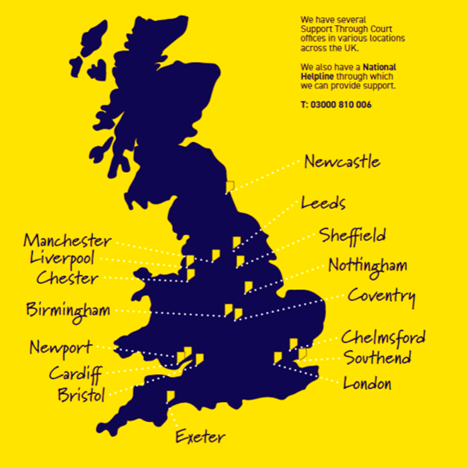January 2018: I’m a retired government lawyer, with some spare moments, when not organising outings for the local Women’s Institute (strangely, many outings ending up with lunch at Middle Temple). Where else could I be useful and ideally employ what little knowledge of the legal system I can still remember (mostly very out of date)?
Master Dawn Oliver collared me at the Treasurer’s Reception. ‘I know what you’d enjoy,’ she said. And within days I was being challenged to see how I would respond if a would-be litigant in person told me he had found little green men in his loft. Nonplussed, I suggested he could take a photo of them and bring it in, and we would take it from there – which apparently was a reasonable answer, the ‘little green men’ proving to be mould in his water tank. I was welcomed as a new volunteer at the Personal Support Unit, now, Support Through Court, a charity which, while it doesn’t give legal advice, offers vital support to litigants in person to help them represent themselves in the civil or family courts to the best of their abilities.
Four years on, I enjoy it even more and look forward to my twice-weekly sessions, now, for me at least, since Covid, on the telephone, though for younger, more intrepid volunteers, willing to face public transport, the offices are still open for face-to-face consultations. About 500 of us, some retired lawyers, some law students exercising their interpersonal skills talking to real clients and many who had no prior connection with the law at all, all trained by Support Through Court, talk clients through the bewildering maze of court forms, help them draft witness statements and accompany them to court hearings.

As the News of the World used to claim, ‘All human life is there.’ In one session, I helped an abused wife fill in an application form for a non-molestation order and helped draft a Scott schedule of episodes of horrifying violence and threatening behaviour; supported two separate tenants in completely different situations apply for stays of possession orders and two landlords seeking possession of rented properties because of their tenants’ defaults; I have listened to a litany of complaints from at least four victims of rogue builders or car salesmen and a widow whose stepson has allegedly forged his late father’s will, disinheriting her. I have referred callers to Shelter, to MIND, to the Refugee Council, to the Royal Courts of Justice Advice service for free legal advice and tried to find out how to enforce a maintenance order for children, awarded in the UK, in Spain when our client refuses to disclose her name to the Spanish court for fear of reprisals over there. All this, over a three and a half hour shift last week.
For so many people, the case they are grappling with, often quite unexpectedly, is their first encounter with lawyers, the court system and the labyrinthine set of rules, practice directions and legal vocabulary involved. It can be a bewildering and frightening experience and the looming prospect of losing their home, their children, or a very large amount of money in a system they don’t understand seems overwhelming and takes over their entire lives. Without recourse to legal aid in many family and almost all civil cases, Support Through Court can often be a lifeline. We can direct them to a local free law centre, through LawWorks, to Advocate (formerly, the Bar Pro Bono Unit) or FRU for tribunal cases. We in turn offer a sympathetic listening ear, an explanation of the court process including how to address the judge, advice on how to prepare a bundle of documents for the court, how to present their case succinctly and clearly to a court or tribunal (‘write out your three main points and keep the piece of paper in front of you at the hearing’) and often accompany clients to the hearing so they feel they have a ‘friend at court’ and someone who can talk through with them after the hearing the implications of the outcome and how to deal with their next steps.
I have taken clients through reams of documents and tried to explain what is likely to happen when they go to court. Much of what we do is helping clients who have wrestled alone with the sheer impossibility of trying to fill in complicated forms on a mobile phone. The court service has taken on board many of our recommendations to make forms more user-friendly, recognising that those who use them are not necessarily familiar with legal jargon and find what should be a comparatively simple process a nightmare. Am I a claimant or an applicant (or both)? Where do I have to send the form (many court forms unhelpfully don’t include an address)? How do I pay and how much? How do I get help with the court fees? This is where Support Through Court can help but the myriad of court forms (and the Government website) could still be improved.
Clients have no concept, for example, of what they may reasonably claim by way of damages, especially when ‘hurt feelings’ or ‘years of misery’ form part of the claim. We can’t advise what sum they ought to put on a claim (legal advice, which we can’t give) but lengthy open-ended discussion often results in a more realistic figure being substituted for the £6 million some of my clients have used as a starting point.
Some of my telephone clients, who take potluck when they ring and the chance that any one of our volunteers could answer the phone, recognise my voice and I feel I am talking to an old friend, which indeed some of them have become, though they know me only as Ros. I communicate with some clients through the Support Through Court email, and they email me back telling me the outcome of their cases, sometimes triumphs which they have achieved by themselves with a little help from us.
Clients can present unusual challenges, such as one who became a constant visitor when I volunteered at the RCJ, who was suing the BBC for infringing their rights under Article 3 of the ECHR, because, as one of many musicians who had submitted compositions, the BBC hadn’t broadcast them, which to them was torture. Others ring up from surprising locations; I have had calls from Poland, from Austria, from France, from California and many from Northern Ireland and Scotland where our writ unfortunately doesn’t run. I have seen, from the perspective of the lay person, how litigants in person are treated in some courts and, while some judges do a great deal to put litigants in person at their ease, it’s not always reassuring. Clients can feel the judge is biased against them because they are not represented, or English is not their first language and they feel they are up against a system that is working against them and not for them.
Support Through Court (then called the Personal Support Unit) was set up in 2001, to meet the needs of people going through the court system alone, after Diana Copisarow OBE, a volunteer for the Witness Service at the Old Bailey, was approached for help by a woman without representation about to go through a divorce from her barrister husband at the Royal Courts. Under great stress, she faced a confusing court system and uncertainty about appearing before a judge. 21 years later, we have branches inside court offices around the country (five in London) as well as the National (telephone) Helpline. We help tens of thousands of people each year.
In 2020/21, 61% of our client contacts were involved in family cases, of which 63% concerned the welfare of children. 17% of cases were concerned with money claims and 4% housing. As things settle down after Covid, we are seeing an increase in queries about employment cases, and housing issues are re-emerging after the protections put in place during the pandemic.

We have been financially supported in part by the Ministry of Justice (MOJ) over the last eight years. The MOJ is re-organising the way it supports legal charities, and we may be facing a significant cut in MOJ grant funding though we very much hope that their support will continue. We also rely heavily on donations from clients and support from the Inns of Court and solicitors’ firms and, increasingly, seeking offers of pro bono legal help for our clients.
If you are a retired barrister, magistrate or judge and would like to volunteer, you would be warmly welcome and have the satisfaction of knowing you are making a real difference to people, who, with the almost complete absence of availability of legal aid in civil and most family cases, have to struggle with a complex and for many, impenetrable, legal system alone.
Do look at the website – www.supportthroughcourt.org for much more information.

Master Ros Wright was Director of the SFO and Chair of the Supervisory Committee of the European Anti-Fraud Office (OLAF) and is currently the LME Complaints Commissioner. She sits on a number of disciplinary committees, including ICAEW, CIMA and IFA. A Bencher since 2001, she was Reader in 2010.




